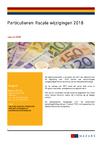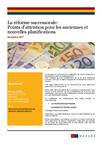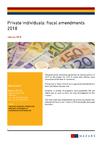Tax Alert Private individuals: fiscal amendments 2018
A large part of those reforms were approved and published in laws, just before the year end.
However, a number of proposals were postponed. We will inform you as soon as there are new developments in this respect.
The most important amendments for private individuals who entered into force since 1 January 2018 are briefly discussed hereafter.
1) Car expenses
From 1 January 2018, professional car expenses incurred by private individuals – in case of proof of actual professional expenses – will be deductible in function of the CO2-emissions of the car, as already is the case for car expenses borne by companies. The uniform deductibility of 75% thus disappears.
For cars purchased before 1 January 2018, the deduction will be determined in function of the CO2-emissions, though, with a minimum of 75%.
As was previously the case, certain vehicles are excluded (taxi service, vehicles from recognized driving schools and vehicles that are only rented to third parties). Furthermore, the new regulation provides a fourth exception, namely expenses which are recharged to third parties are excluded for the deduction restriction, provided they are explicitly stated separately on the invoice.
2) Withholding tax exemption
2.1. Savings
From 1 January 2018, the exemption of interests resulting from saving deposits will be limited to 960.000 EUR instead of 1.888,00 EUR. This as a measure to reduce the attractiveness of saving and to activate ‘dormant’ money of companies.
2.2. Dividends
In order to stimulate the activation of savings, also a tax exemption on dividends is provided as of 1 January 2018. On the first tranche of 640,00 EUR received in dividends, the taxpayer will pay no taxes, which will lead to a benefit of 192,00 EUR (640,00 x 30% WHT). The tax exemption will have to be arranged via the personal income tax return / tax return for non-residents.
3) Investments
3.1. Tax on securities accounts
The tax on securities accounts, as announced in our newsletter, was not approved at the end of 2017. We will inform you as soon as the measure is approved.
3.2. Tax on stock exchange transactions
The tax on stock exchange transactions will increase as of January 2018.
- The applicable rate for transactions with shares increased from 0,27% to 0,35%; and
- The applicable rate for transactions with bonds increased from 0,09% to 0,12%.
3.3. Gains of bond funds
Until 31 December 2017, capital gains resulting from the sale of participations in collective investment schemes in securities was taxed as movable income at a rate of 30% insofar as these funds invested more than 25% of their assets (directly or indirectly) in interest-bearing products.
This threshold is reduced to 10% for all participations acquired since 1 January 2018.
In addition, the term ‘collective investment institutions in securities’ will be replaced by ‘institutions by collective investment’ from 1 January 2018. Hereby, the legislator wants to clarify that institutions not investing in securities (such as regulated private equity funds) also fall under the scope providing they reach the threshold of 10%.
4) Cayman tax
The Cayman tax is created to tax income from assets that are artificially separated by means of legal constructions. It is now adjusted in order to clarify the legislation and to further extend the scope of the law. We refer to our separate newsletter for more information regarding these changes.
5) Interests
5.1. Moratorium interests
Moratorium interests are interests stipulated by law, which have to be paid by the State in the event of reimbursement of taxes, withholding taxes, advance payments, late-payment interests, tax increases or administrative fines. For budgetary reasons, the interest rate will be linked to the Belgian linear bond interest rate, which amounts to minimum 2% for 2018. Before, the interest rate used to be 7%.
5.2. Late-payment interest
Late-payment interests are interests stipulated by law, which have to be paid if the taxpayer has not fulfilled his fiscal debt within the legal payment term in accordance with the law. This interest rate has been 7% since 1996. From 2018 onwards, late-payment interests will be 2% higher than the moratorium interests and will thus amount at least 4%.



